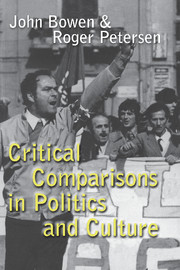Book contents
- Frontmatter
- Contents
- List of Figures
- List of contributors
- Acknowledgments
- 1 Introduction: critical comparisons
- 2 National revivals and violence
- 3 Mechanisms and structures in comparisons
- 4 Comparative methodologies in the analysis of anthropological data
- 5 The role of comparison in the light of the theory of culture
- 6 Case studies of contemporary job loss
- 7 Defining the contours of an Islamic reform movement: an essay in successive contrasts
- 8 Producing an analytic narrative
- 9 Political consciousness on Boa Ventura: 1967 and 1989 compared
- 10 Comparisons in the context of a game theoretic argument
- 11 The role of microhistories in comparative studies
- List of references
- Index of authors
- Subject index
5 - The role of comparison in the light of the theory of culture
Published online by Cambridge University Press: 28 January 2010
- Frontmatter
- Contents
- List of Figures
- List of contributors
- Acknowledgments
- 1 Introduction: critical comparisons
- 2 National revivals and violence
- 3 Mechanisms and structures in comparisons
- 4 Comparative methodologies in the analysis of anthropological data
- 5 The role of comparison in the light of the theory of culture
- 6 Case studies of contemporary job loss
- 7 Defining the contours of an Islamic reform movement: an essay in successive contrasts
- 8 Producing an analytic narrative
- 9 Political consciousness on Boa Ventura: 1967 and 1989 compared
- 10 Comparisons in the context of a game theoretic argument
- 11 The role of microhistories in comparative studies
- List of references
- Index of authors
- Subject index
Summary
It is my opinion that the main object of ethnological collections should be the dissemination of the fact that civilization is not something absolute, but that it is relative, and that our ideas and conceptions are true only so far as our civilization goes.
(Boas 1887b: 589)The heart of culture
My point of departure in this chapter is the following proposition: comparison is at the heart of culture; culture would not be possible without it. For some readers, this will make instantaneous sense. Others, however, will scratch their heads. Isn't “our culture” what we take for granted? Doesn't it just seem natural — part of the normal order of the universe? Consequently, isn't comparison an unnatural act, one that forces upon us an awareness of the conventional character of what we think of as given? Surely, it has been a key task of anthropology, as part of a larger public debate, to point out to us the constructed character of our world, to unmask as conventional those things we want most to presuppose as natural.
For purposes of this chapter, I take the term “culture” in its broadest sense as that which is socially learned — through imitation, teaching, and inference from observation of others. The question is: how is social learning possible? I will argue that it is possible only thanks to comparison, and, consequently, that comparison is at the heart of culture.
There have been innumerable cases made for using the comparative method to gain certain kinds of information about culture or social structure or human beings or human brains, but, to my knowledge, none has attempted to ground comparison in the very mechanism of culture itself.
- Type
- Chapter
- Information
- Critical Comparisons in Politics and Culture , pp. 90 - 109Publisher: Cambridge University PressPrint publication year: 1999
- 13
- Cited by



